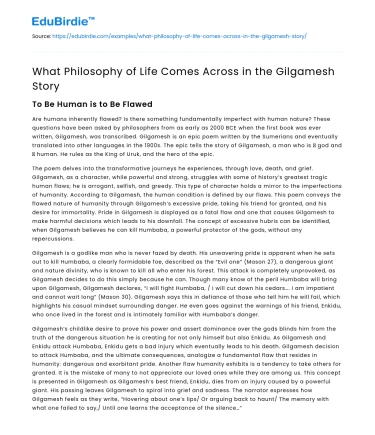To Be Human is to Be Flawed
Are humans inherently flawed? Is there something fundamentally imperfect with human nature? These questions have been asked by philosophers from as early as 2000 BCE when the first book was ever written, Gilgamesh, was transcribed. Gilgamesh is an epic poem written by the Sumerians and eventually translated into other languages in the 1900s. The epic tells the story of Gilgamesh, a man who is ⅔ god and ⅓ human. He rules as the King of Uruk, and the hero of the epic.
The poem delves into the transformative journeys he experiences, through love, death, and grief. Gilgamesh, as a character, while powerful and strong, struggles with some of history’s greatest tragic human flaws; he is arrogant, selfish, and greedy. This type of character holds a mirror to the imperfections of humanity. According to Gilgamesh, the human condition is defined by our flaws. This poem conveys the flawed nature of humanity through Gilgamesh’s excessive pride, taking his friend for granted, and his desire for immortality. Pride in Gilgamesh is displayed as a fatal flaw and one that causes Gilgamesh to make harmful decisions which leads to his downfall. The concept of excessive hubris can be identified, when Gilgamesh believes he can kill Humbaba, a powerful protector of the gods, without any repercussions.
Save your time!
We can take care of your essay
- Proper editing and formatting
- Free revision, title page, and bibliography
- Flexible prices and money-back guarantee
Gilgamesh is a godlike man who is never fazed by death. His unwavering pride is apparent when he sets out to kill Humbaba, a clearly formidable foe, described as the “Evil one” (Mason 27), a dangerous giant and nature divinity, who is known to kill all who enter his forest. This attack is completely unprovoked, as Gilgamesh decides to do this simply because he can. Though many know of the peril Humbaba will bring upon Gilgamesh, Gilgamesh declares, “I will fight Humbaba, / I will cut down his cedars…. I am impatient and cannot wait long” (Mason 30). Gilgamesh says this in defiance of those who tell him he will fail, which highlights his casual mindset surrounding danger. He even goes against the warnings of his friend, Enkidu, who once lived in the forest and is intimately familiar with Humbaba’s danger.
Gilgamesh’s childlike desire to prove his power and assert dominance over the gods blinds him from the truth of the dangerous situation he is creating for not only himself but also Enkidu. As Gilgamesh and Enkidu attack Humbaba, Enkidu gets a bad injury which eventually leads to his death. Gilgamesh decision to attack Humbaba, and the ultimate consequences, analogize a fundamental flaw that resides in humanity: dangerous and exorbitant pride. Another flaw humanity exhibits is a tendency to take others for granted. It is the mistake of many to not appreciate our loved ones while they are among us. This concept is presented in Gilgamesh as Gilgamesh’s best friend, Enkidu, dies from an injury caused by a powerful giant. His passing leaves Gilgamesh to spiral into grief and sadness. The narrator expresses how Gilgamesh feels as they write, “Hovering about one’s lips/ Or arguing back to haunt/ The memory with what one failed to say,/ Until one learns the acceptance of the silence…” (Mason 54). This quote highlights the feelings Gilgamesh experiences during his time of grief for his friend. The narrator demonstrates the human feeling of universal regret in facing the loss of a loved one.
Regret is equated to the things Gilgamesh will never get to tell Enkidu while he was alive, and the appreciation he has for Enkidu will never be expressed. This under-appreciation of loved ones is highlighted through Gilgamesh’s experience of grief and regret. Gilgamesh’s desire for immortality highlights the third flaw of Gilgamesh; greed. After the death of Enkidu, Gilgamesh’s feelings of remorse and grief overwhelm him to the extent that he believes he can successfully pursue immortality for himself and Enkidu. The consequential impact of greed on Gilgamesh can be seen through the decision to embark on a long and arduous journey to find everlasting life. He displays his blind yearning to achieve immortality as he proclaims, “Which is the way to Utnapishtim? I must know!/ Is this the sea? the mountains? I will go there!” (Mason 69).
Utnapishtim is a god who knows the secret to everlasting life. Gilgamesh’s desire for immortality is so immensely powerful that it restricts him from thinking clearly. He abandons his kingdom and attempts to pursue Utnapishtim while leaving his home and family behind. Gilgamesh’s search for immortality was futile, illustrating that greed doesn’t always lead to the desired outcome. In the end, Gilgamesh eventually learns to accept the death of his best friend and is able to move on from his terrible grief. Gilgamesh ultimately realizes his faults and learns from them, by returning to his kingdom. The epic poem of Gilgamesh uses the flaws of Gilgamesh to identify the human condition. The arrogance, greed, and self-centered traits of Gilgamesh highlight some of the main flaws of humanity. Yet, is humanity doomed for good? Are humans destined to be flawed? Or can humanity recognize its flaws, like Gilgamesh, and better ourselves?






 Stuck on your essay?
Stuck on your essay?

